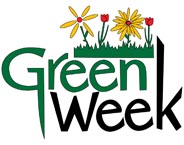Germans flock to Green Week food fair
 Berlin - The mood at the 2009 International Green Week agricultural fair in Berlin is upbeat despite continuing concerns at the world food situation and the crisis in money markets.
Berlin - The mood at the 2009 International Green Week agricultural fair in Berlin is upbeat despite continuing concerns at the world food situation and the crisis in money markets.
Some l, 610 exhibitors from 52 countries are participating in the event, with Russia - for the second year running - again the largest foreign exhibitor, occupying more than
6,000 square metres of space.
Held annually since the 1930s, the Green Week offers a unique opportunity for the farm world to gauge trade fluctuations and trends.
"The world food situation is the central issue of our time," said Gerd Sonnleitner, the president of the German Farmers' Union (DBV), at the opening of the week-long exhibition on Friday.
The world, he said, could not be proud that the millennium target of halving the number of starving people in the world had, "not been reached by a long way."
Safeguarding of world food supplies was now one of the key issues affecting the future of mankind, he added.
While the Green Week has always acted as a prism for the German food and agricultural sector, it also serves as a powerful marketing outlet for countries like Norway, Sweden, Finland, France, Austria, Poland, Bulgaria and Rumania.
Curiously Britain, the United States and Denmark do not have national displays this year, relying on German import firms to represent their interests.
Countries like Syria, Burkina Faso and, Kyrgyzstan, offer surprises at this year's event.
Syria is seeking to gain European markets for some of its products, said Muawya Jaber, head of the export development division at the Ministry of Agriculture and Agrarian Reform in Damascus.
"We don't seek to sell products directly over the counter to Green Week visitors. Our aim is to gain contact with German distribution companies and gain a foothold in the market," said Jaber.
Cumin and aniseed oil, flower and rose water, pomegranate sauce, sesame paste and a wide range of assorted pickles are prominently displayed at its stand.
Burkina Faso provides a colourful return to the Green Week after a long absence. Its stand in Hall 18 attracts a constant stream of visitors.
Face and body creams, mango juices and jams, cashew nuts, sesame seeds, dried fruits, hibiscus marmalade and cotton and textile products are on display, against a background of live African music.
"We are absolutely delighted to have this opportunity at the Green Week," said Pato Dondasse, who represents a Burkina Faso communications firm. "The German Technical Cooperation Agency (GTZ) made it possible through their backing and support."
"Our staff is kept at full stretch dealing with customer enquiries about our foodstuffs and other products," he said.
Burkina Faso, a landlocked nation in West Africa surrounded by six countries, has been making a big effort in recent years to overcome its image as one of Africa's poorer nations.
Kyrgyzstan is represented at the Berlin event for the first time.
"Agriculture is a key industry and makes up a third of our gross domestic product," noted Agriculture Minister Arstanbek Nogoyev. "We intend to promote this sector for exports." (dpa)